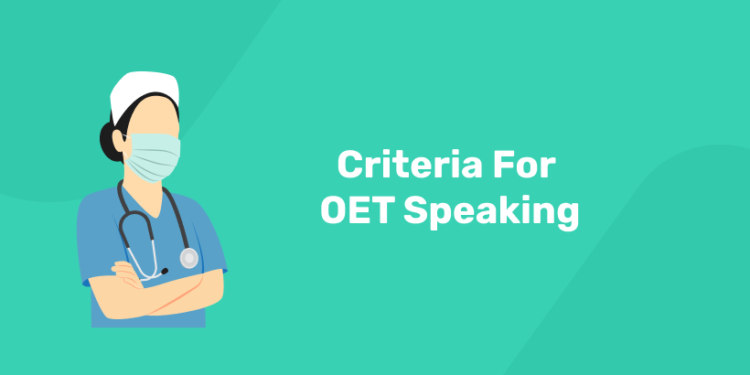Table of Contents
Are you a healthcare professional preparing for the OET Speaking test? Understanding the OET speaking criteria can be the key to unlocking your international career opportunities!
Introduction to OET Speaking
OET Speaking is the gateway for healthcare professionals to demonstrate their English communication skills. In the competitive world of international healthcare, cracking this test can open doors to exciting career opportunities across English speaking countries.
For Indian healthcare professionals, OET Speaking test is more than just an English exam – it’s a ticket to global medical opportunities. Whether you are a nurse, doctor or allied health professional, knowing the criteria can make the difference between success and failure.
Overview of OET Speaking
1: What is the primary purpose of a patient’s discharge summary?
OET Speaking is designed to assess language proficiency in a healthcare context. Unlike general English tests, it focuses on the communication skills required in medical and healthcare settings. The test involves a role-play scenario where candidates interact with a patient and demonstrate their ability to communicate in real-life medical situations.
Key Components of the OET Speaking Test
OET speaking is one of the most important components of the Occupational English Test. It replicates real-life scenarios healthcare professionals face in clinical settings. Here’s what you need to know about its structure:
- Role-play based assessment
- 15-20 minutes in duration
- One-on-one interaction with an interlocutor
- Profession-specific scenarios
The OET speaking sub-test is designed to assess whether you can effectively and empathetically communicate with patients and other healthcare professionals.
Crack OET & Boost Your Healthcare Career!
OET Coaching by Entri App: Get expert guidance, practice with real exam scenarios, and achieve your target score to advance your healthcare career.
Join Now!OET Speaking Criteria
To succeed you need to know what the examiners are looking for. The OET speaking criteria is based on two sets of criteria:
- Linguistic Criteria: Focuses on your language.
- Clinical Communication Criteria: Assesses your ability to communicate empathetically and appropriately in a healthcare context.
Let’s break these down.
Linguistic Criteria
- Intelligibility:
- How well you pronounce words.
- Includes accent, clarity and intonation.
- Tip: Practice neutralising your accent for global understanding.
2. Fluency:
- Smooth and natural speech delivery.
- Don’t use frequent pauses or fillers like “umm” or “you know”.
- Tip: Practice with a timer to improve flow.
- Language Appropriacy:
- Use professional yet patient friendly language.
- Don’t use jargon with patients unless it’s essential and well explained.
- Tip: Learn phrases to simplify medical terms.
- Resources of Grammar and Vocabulary:
- Use varied sentence structures and accurate grammar.
- Don’t repeat mistakes in tenses, articles and prepositions.
- Tip: Brush up on grammar basics and practice structuring responses.
Clinical Communication Criteria
- Relationship Building:
- Be empathetic and respectful.
- For example, “I know this must be tough for you,” can go a long way.
- Patient’s Perspective:
- Listen actively to the patient’s concerns.
- Respond to their specific worries not generalised.
- Structure:
- Organise your responses logically.
- For example, address the patient’s immediate concern before the treatment plan.
- Information Gathering:
- Ask open and closed questions effectively.
- Get the whole picture of the patient’s situation.
- Information Giving:
- Be clear, concise and relevant.
- Don’t overwhelm the patient with unnecessary information.
- Patient Support:
- Reassure the patient and make them feel understood.
- Tip: Use phrases like, “Don’t worry we will address this together.”
Get your Desired OET Scores in Weeks! Get a Free Demo Class Here!
OET Speaking Challenges for Indian Healthcare Professionals
- Accent Neutrality: Indian accent can be strong which may affect understanding.
- Time Management: Over explaining or rushing through answers can lower your score.
- Cultural Differences: Phrases or approaches common in India may not work with Western patients.
Solution: Enrol in an OET course designed for Indian professionals.
OET Speaking Tips and Strategies
To do well in the OET speaking test you need to prepare. Here are some tips:
Practice Regularly
Practice is key to improving your speaking skills. Use role play scenarios to simulate the test. Practice with a friend or use online resources. The more you practice the more confident you will be.
Join an OET Course
Consider joining an OET course like the one offered by Entri. Their OET online classes for nurses provide expert guidance and structure to help you master the speaking test. You’ll get personal feedback and mock tests that are very close to the actual test. Check out Entri.
Record Yourself
Recording yourself can be very helpful. Listen to your recordings and see where you can improve. Focus on your fluency, pronunciation and clarity. This self assessment will guide your practice sessions.
Medical Vocabulary
Familiarize yourself with medical terminology related to your field. This will help you to communicate effectively and accurately. Make flashcards or use apps to reinforce your learning. Being comfortable with medical language will give you more confidence during the test.
Get Feedback
Don’t be afraid to get feedback from mentors or peers. Constructive criticism will help you to identify your strengths and weaknesses. Use this feedback to refine your skills and work on the areas that need improvement.
OET Speaking Tips
- Role Play:
- Practice healthcare scenarios with friends or mentors.
- Record and Review:
- Listen to your own recordings to identify areas to work on.
- Focus on Empathy:
- Empathy is as important as linguistic accuracy.
- Get Expert Guidance:
- Professional coaching will help you practice the right way.
Crack OET & Boost Your Healthcare Career!
OET Coaching by Entri App: Get expert guidance, practice with real exam scenarios, and achieve your target score to advance your healthcare career.
Join Now!OET Speaking Mistakes to Watch Out For
As you prepare for the OET speaking test, be careful of:
Overusing Complex Language
Using advanced vocabulary is good but don’t overdo it. Focus on clarity not complexity. The patient needs to understand you not be impressed by your big words.
Ignoring Non Verbal Cues
Remember communication is not just verbal. Pay attention to your body language and facial expressions. They play a big part in showing empathy and understanding during the interaction.
Not Managing Time
Time management is key in the OET speaking test. Practice your timing so you can cover all the points within the time given. This will help you feel more relaxed during the actual test.
Conclusion
In summary, knowing the OET speaking criteria is key. By focusing on both language and clinical communication, you can do better in the test. Regular practice, enrolling in a course like Entri and getting feedback will help you more.
Remember, OET speaking is not just a test – it’s your opportunity to showcase your professional communication skills and open doors to exciting international healthcare roles!
Ready to ace your OET Speaking test? Start your journey with Entri OET Online Classes today!
Crack OET & Boost Your Healthcare Career!
OET Coaching by Entri App: Get expert guidance, practice with real exam scenarios, and achieve your target score to advance your healthcare career.
Join Now!Frequently Asked Questions
What is OET Speaking?
OET Speaking is a sub-test of the Occupational English Test that assesses healthcare professionals’ ability to communicate effectively in real-life clinical scenarios.
How long does the OET Speaking test last?
The OET Speaking test typically runs for 15-20 minutes, involving a one-on-one interaction in a profession-specific scenario.
Why is OET important for nurses?
The OET test will help the nurses to mingle with real-life scenarios and confront themselves with better language skills. The highly familiar language contexts shall be explored and this will help the nurses to perform well. The OET is famous for the fair assessment methods that will aid the nurses in communicating in a better way.
How is OET Speaking evaluated?
The evaluation is based on two criteria: Linguistic (grammar, fluency, intelligibility) and Clinical Communication (empathy, structure, and patient support).
What are the common challenges faced by Indian test-takers in OET Speaking?
Indian test-takers often face challenges like accent neutrality, time management, and adapting to Western cultural expectations in communication.
How can I improve my fluency for OET Speaking?
Practice speaking English daily, record and review your responses, and enrol in professional coaching like Entri’s OET course.
Why is empathy important in OET Speaking?
Empathy helps in building trust and rapport with patients, which is a key component of effective clinical communication.
Can I use technical medical terms in OET Speaking?
Yes, but ensure you explain them in simple terms to patients who might not have medical knowledge.
How can Entri’s OET course help me prepare for OET Speaking?
Entri’s OET course offers tailored coaching for Indian healthcare professionals, including role-play practice, expert feedback, and strategies to excel in OET speaking.
What are the main criteria for OET Speaking?
The test evaluates two primary areas:
- Linguistic Criteria: Grammar, vocabulary, pronunciation, and fluency
- Clinical Communication Criteria: Patient interaction, information management, and professional communication












